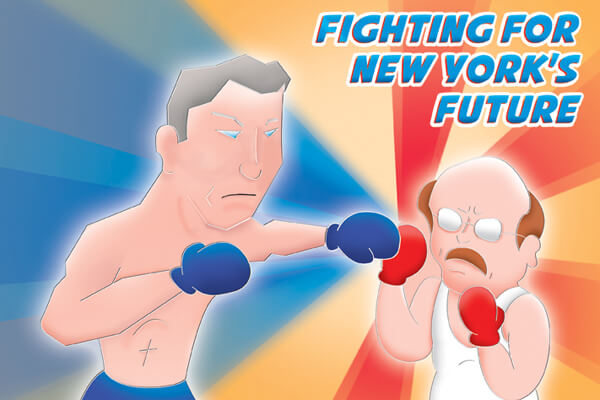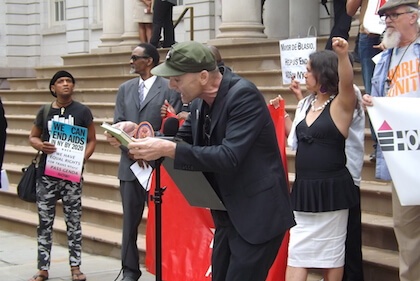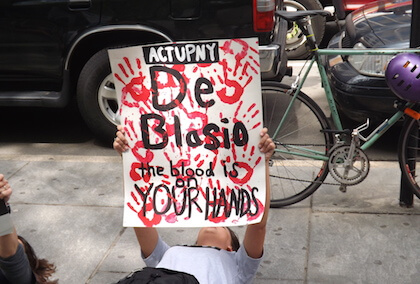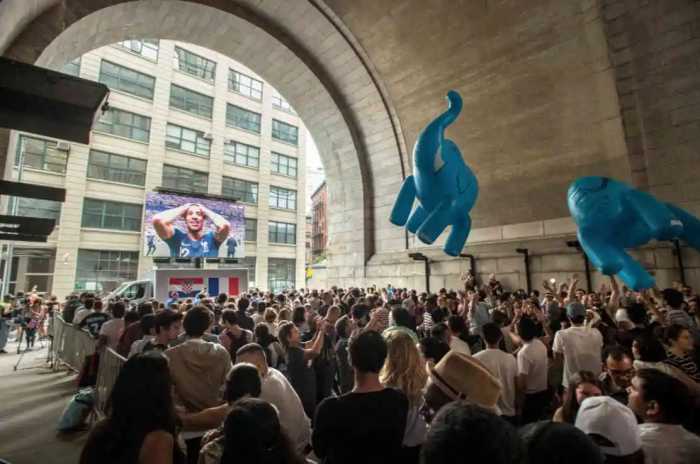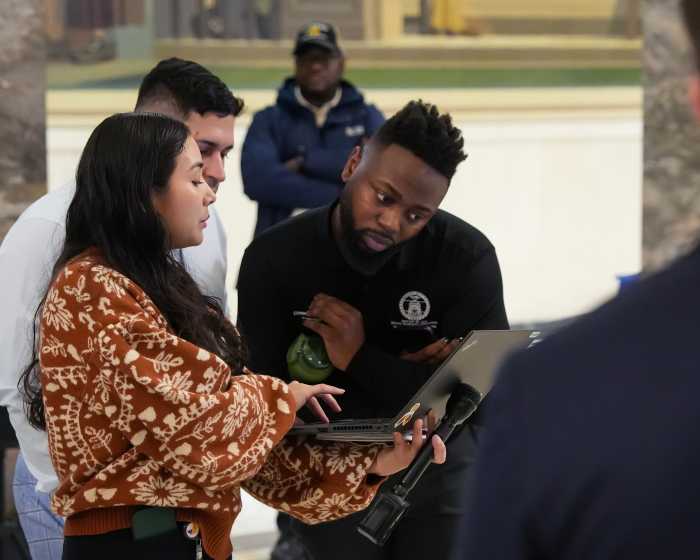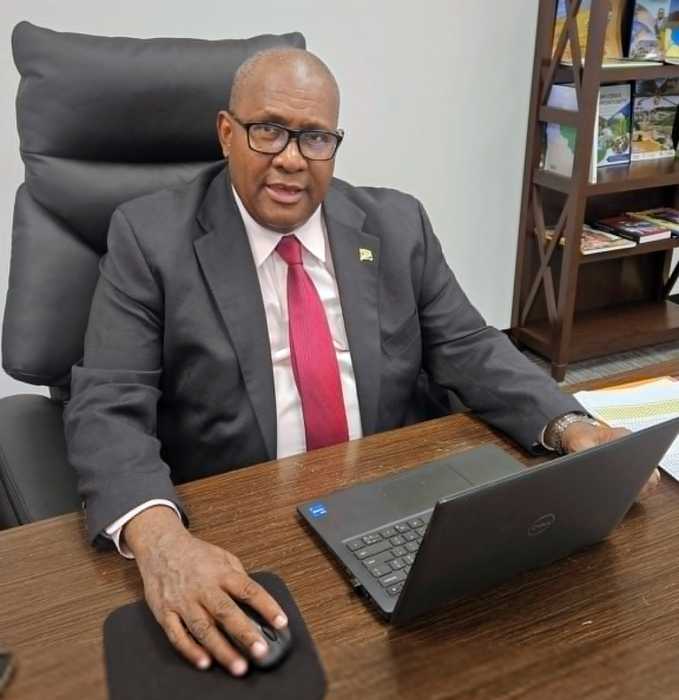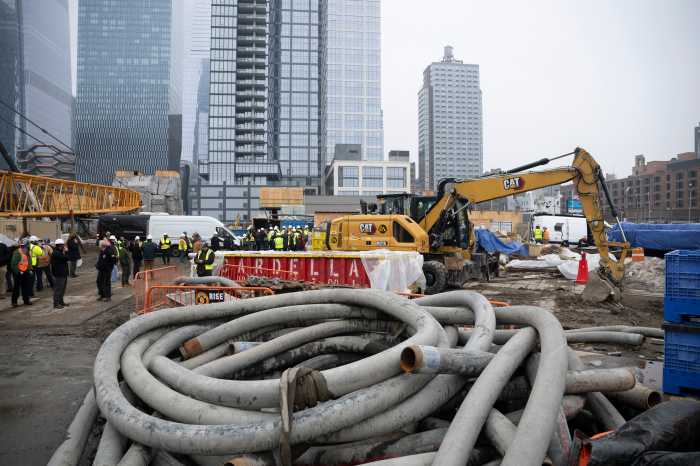COVER ILLUSTRATION BY MICHAEL SHIREY
GAY CITY NEWS ENDORSEMENT | It’s been 20 years since New York, an overwhelmingly Democratic town, has had a Democratic mayor. During that period, a number of trends cheered many, probably most New Yorkers. Crime went down dramatically; the 414 murders in 2012 represented an astonishing decline of almost 80 percent since 1993. With safer streets, tourism boomed, pumping dollars into the city and further burnishing the narrative of a New York that was back. Neighborhoods all over town — and crucially, in the outer boroughs — enjoyed renaissances, and New York became a much greener city, far better attuned to critical issues of sustainability.
Unfortunately, that’s only part of the story — the easiest part to tell, in fact.
In terms of policing, what began as a disciplined and technology-driven effort to micro-target patterns of lawlessness evolved into a regime where no stone was left unturned in the drive to protect the gains — regardless of how unlikely it was that any particular stone was hiding something sinister. That was the ethic that led NYPD stops and frisks to soar from 80,000 in 2002 to 685,000 in 2011, with 87 percent concentrated among blacks and Latinos and 88 percent of them uncovering no criminal behavior at all (even possession of small amounts of marijuana).
It’s odd to think this explosion in police harassment of communities of color happened under Michael Bloomberg instead of his more volatile and abrasive predecessor Rudy Giuliani, until you consider that the years since 2002 encompass New York’s entire post-9/11 history. Here and nationwide, an unfortunate hangover from that tragic day is that the goal of security has come to justify almost any means. Stops and frisks mushroomed during the very years that the NYPD undertook an undercover surveillance program aimed at the Muslim community.
As communities of color have experienced more invasive and arbitrary policing, their economic prospects have become more tenuous. Even as the nation gradually emerges from the depths of the Great Recession, income inequality in New York has gone up in each of the past three years. Most sobering is the fact that almost 51,000 New Yorkers are now housed in homeless shelters, a figure twice that of 1993. And advocates for youth estimate that on any given night, 3,800 young people have no roof over their head at all, with as many as 40 percent of them LGBTQ-identified.
These are the issues Bill de Blasio is talking about when he speaks of a tale of two cities. Crime is down and Brooklyn is hip, but young black men face too much police harassment and economic opportunities for the poorest New Yorkers are grim and show no promising signs of improvement. The best of times; the worst of times.
A Brooklyn city councilman for eight years before becoming public advocate, de Blasio has articulated an “unapologetic progressive” vision for the city, backed up by laudable policy positions. He pulls no punches in challenging prevailing Bloomberg law enforcement thinking. The city’s overreliance on stop and frisk has presumptively criminalized young men of color and eroded the community trust essential for keeping crime down long-term. The buck stops with Bloomberg and Ray Kelly. The NYPD needs greater independent oversight and it needs a new commissioner.
De Blasio also understands his responsibility to redouble New York’s commitment to public education. That means providing universal pre-K and better after-school programs. It also means that public schools cannot be forced to share facilities with better funded charter schools that rob students in the city system of needed space and resources while offering their own students higher tier educational opportunities in the very same building. De Blasio aims to fund his pre-K effort through a modest increase in city income tax rates on those earning half a million dollars or more. It’s an unfortunate measure of the Democratic Party’s retreat from a belief in a progressive income tax structure that Governor Andrew Cuomo is widely expected to refuse support for that goal in Albany, which must give the city its approval.
The public advocate has also committed to leverage the power of $1 billion in city pension assets — well under one percent of the total — toward investments in affordable housing. His overall housing agenda, which also calls for enactment of mandatory inclusionary zoning and elimination of tax incentives that keep land vacant, aims to create or preserve 200,000 affordable units over the next decade.
On LGBT issues, de Blasio has a record that is long and strong. A supporter of marriage equality and transgender civil rights throughout his public career, this year he has endorsed specific proposals sought by advocates to increase housing for homeless LGBT youth, to guarantee that people living with AIDS pay no more than 30 percent of their income in rent, to end the practice by police and prosecutors of using condom possession as evidence of prostitution, and to streamline the process for transgender New Yorkers wishing to change the gender designation on their birth certificates so they can obtain the other identification documents they need.
All of these factors alone would more than merit our endorsement of de Blasio as the next mayor. The case is made even stronger by the fact that Republican Joe Lhota lands precisely on the opposite side of so many key issues. With hyperbolic imagery and gratuitous references to former Mayor David Dinkins — the city’s only black mayor, but also the one who oversaw initial declines in crime — Lhota has warned that de Blasio’s efforts to curb police excesses will bring back the “bad old days.” The Republican also demonstrates a tin ear on other pressing questions of inequality — whether in economic opportunity, a fair balancing of the income tax burden, or protection of the city’s public education tradition.
Lhota has won kudos for being pro-choice and pro-marriage equality, but it’s worth remembering that the mayoral administration where he worked — Giuliani’s — consistently fought to evade its responsibilities for the delivery of AIDS services. And that it was Joe Lhota who led the pernicious drive to defund the Brooklyn Museum when it dared display art that offended Giuliani — even if the mayor never saw it and described it in terms starkly at odds with what it was.
In the Democratic primary, Gay City News endorsed City Council Speaker Christine Quinn over de Blasio. Then, as now, we believed that the Democratic field was a particularly strong one with regard to LGBT issues and progressive goals generally. Quinn, we felt, had a special appreciation for some LGBT issues and we concluded her years as speaker tested her under fire with challenges her rivals never faced.
Now, we place our hopes in de Blasio’s ability to achieve the lofty vision he’s laid out. An early test will come when the governor responds to his income tax proposal. Voters who believe not only in the man, but also in his plan need to demonstrate that a de Blasio victory, which now seems inevitable, is an unmistakable mandate for progressive change. In the context of New York politics, the Working Families Party delivers that message. So, on November 5, vote for Bill de Blasio and place your check on the Working Families ballot line when you do so.

